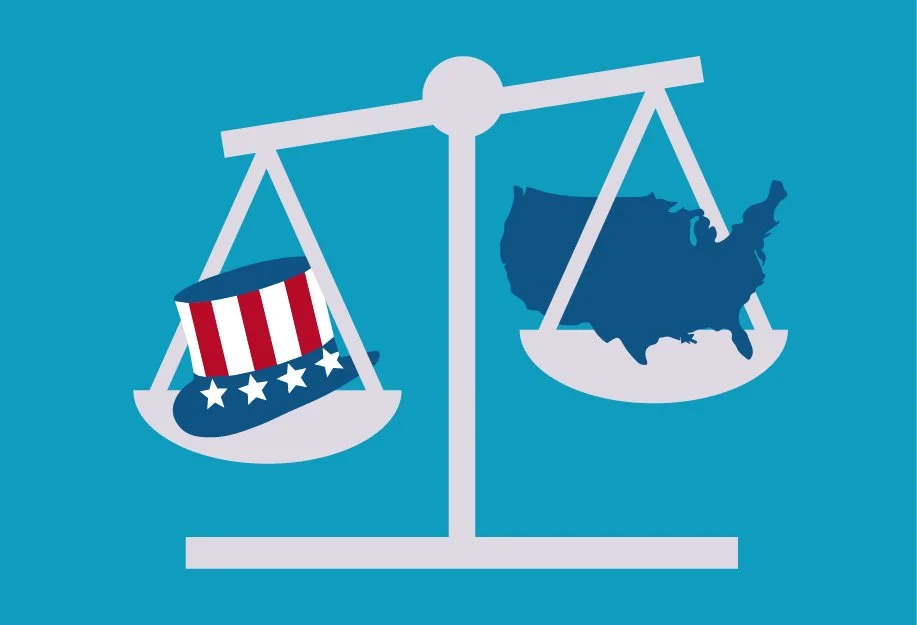The Fight for Rights Has Moved to the States.
Lawyers Are Fighting Back.
Join the State Legislative Advocacy Academy & help l4gg defend democracy, civil rights, and justice at the state level.
My name is Traci Feit Love. I’m the founder and executive director of Lawyers for Good Government and the L4GG Action Fund.
Since 2016, we have mobilized 125,000 lawyers and law students to fight for systemic change—on immigration, racial justice, LGBTQ+ rights, voting rights, reproductive healthcare, environmental justice, and more. Our community has contributed over $150 million in pro bono legal services. That power is real.
But right now, we are facing something different.
The federal government is operating without meaningful guardrails. We have watched executive orders target law firms for representing their clients. We have seen mass firings of inspectors general, threats against judges who rule against the administration, and billions of dollars in congressionally authorized funding unlawfully terminated. Federal agencies are being weaponized against civil society, scientific research, environmental justice, and the nonprofit sector itself.
And here is what that means for the states: as federal protections erode, state legislatures have become the front line.
Some states are pushing back—passing laws to protect their residents, defend democratic norms, and fill the gaps left by federal retreat. Others are accelerating the damage—banning abortion, restricting healthcare for transgender people, undermining voting rights, and gutting environmental protections.
The policy decisions being made in state capitols right now will define the rights and protections available to hundreds of millions of Americans for years to come.
As lawyers, we have skills and expertise that can make a real difference in these fights. But only if we are willing to show up and do the work.
That is why we built the State Legislative Advocacy Academy—a first-of-its-kind training program designed to teach lawyers and law students how to use their unique skills and privilege to influence public policy in their home states. Through expert-led sessions, you will gain the essential knowledge and skills needed to begin your state legislative advocacy journey and impact public policies that matter to you.
The Academy has already trained hundreds of attorneys across the country. And in 2026, we are expanding—with new live training sessions, a growing L4GG Leadership Program, and an urgent mandate to build the capacity of the legal profession to defend democracy from the ground up. We hope you’ll join us.
NEED TO LEARN MORE FIRST? JUMP TO:
Why State-Level Advocacy Matters More Than Ever
The Federal-to-State Power Shift
We are living through an unprecedented transfer of power from the federal government to the states—and not by design. As the current administration dismantles federal protections, defunds enforcement agencies, and terminates billions in authorized grants, state governments are being forced to decide: will they protect their residents, or will they follow the federal lead?
The consequences are already visible across the country:
27 states have banned or restricted gender-affirming care for minors, with several states now attempting to extend those bans to adults.
Billions of dollars in clean energy and environmental justice funding authorized by Congress have been unlawfully terminated, devastating frontline communities.
DHS enforcement operations are escalating in cities across the country, while states like Minnesota and Illinois push back with protective legislation.
The judiciary is under attack — threats of impeachment against judges, public intimidation campaigns, and defiance of clear court orders are testing the foundations of our legal system.
In this environment, state legislatures are where the most consequential policy battles are being fought. Abortion access. Voting rights. Environmental protections. Immigration enforcement. Criminal justice. Public education. The rights available to you depend increasingly on where you live.
Lawyers are uniquely positioned to influence these fights. The caliber of research, writing, analysis, and oral communication that we perform as part of our everyday work can be deployed within the legislative arena—with the right training and the right partners. That’s why we brought on Mandy Hagseth to lead the Academy.
Mandy Hagseth, Director of State Advocacy & Democratic Engagement
Mandy Hagseth, Director of State Advocacy & Democratic Engagement
Mandy Hagseth leads L4GG’s state-level advocacy and democratic engagement programs. Mandy brings over twenty years of experience mobilizing and advocating for state policy change—and a track record of winning.
In Missouri, she served as Director of Policy & Advocacy at Missouri Family Health Council (now Beacon Reproductive Health Network), where she:
Built a policy and advocacy department from the ground up;
Helped develop a statewide contraceptive equity initiative; and
Led the successful passage of a historic bipartisan health bill.
Mandy knows what it takes to defend against attacks in hostile environments and make progress – exactly the kind of impact the SLAA is designed to help you make in your home state.
2026 Training Sessions
The 2026 SLAA features a series of live, expert-led training sessions covering the core skills lawyers need to engage in state legislative advocacy. Sessions are delivered virtually and are designed to build on each other.
To apply for the L4GG Leadership Program, participants must complete Modules 1–5. Modules 6–7 are encouraged but not required. Additional optional programming will be offered throughout the series.
The L4GG Leadership Program
The L4GG Leadership Program is a year-long intensive program designed for attorneys who want to go beyond training and take direct action in their home states. Leaders receive. To be considered for the Leadership Program you must graduate from SLAA.
The program consists of:
Coaching calls with L4GG staff and partner organizations
Peer learning and networking with advocates across the country working at the state level
Resources to mobilize lawyers in their states
COMING SOON- JUNE 2026!
“ I also wanted to let you know that after learning so much in the Leader Group about the Legislative process and discussions on the importance of each of us finding a way to help others through Legislative advocacy, community volunteering, and other service, I have filed to run for the Arizona Senate in the 2026 election. You all inspired me! Because MAGA Republicans are very entrenched in my district, only the MAGA Republican currently in the office runs, often with no other choice available to voters. He’ll be hard to defeat, but I felt compelled to run and give voters a choice. Lots to do with collecting signatures, etc. Wish me luck! ”
SLAA Graduates and L4GG Leaders
Since launching in 2022, the SLAA has trained hundreds of attorneys from 48+ states. 55 have served as L4GG Leaders, using their training to engage in legislative advocacy and mobilize other lawyers in their home states.
In mid-2026, we will recruit a cohort of 25 Leaders who will receive intensive support, coaching, and resources to make an impact in their state legislatures.
SLAA Graduation Requirements
If you complete Modules 1-5 of the 2026 SLAA training series, you will receive a Certificate of Achievement from L4GG and become eligible to apply for the L4GG Leadership Program.
While not required, we strongly encourage you to view all sessions to enrich your learning experience and build the full skill set needed for effective advocacy.
Frequently Asked Questions
-
Go to L4GG.org/SLAA and fill out the online registration form (it should take less than 2 minutes).
-
The 2026 Academy features a series of live, expert-led training sessions covering core state legislative advocacy skills. Sessions are delivered virtually and build on each other to give participants a comprehensive foundation for state-level advocacy.
-
How State Legislatures Work
The Budget Committees (The Main Stage)
Communicating Effectively with Lawmakers (Talking to Legislators)
Collaboration & Partnerships
Each session is led by expert speakers with deep experience in state-level advocacy, policy reform, and legislative strategy. Our past trainers have included leaders from organizations such as Planned Parenthood Alliance Advocates, Documented, the Annie E. Casey Foundation, the California Budget and Policy Center, the State Innovation Exchange, and many more.
-
No. Law students, those with a JD, and public service-oriented individuals are welcome to participate and learn what they can do to influence positive change in their home states.
-
We want this program to be accessible to everyone. For that reason, we have chosen not to charge a fee to access our trainings.
At the same time, this is a comprehensive training program that requires resources to implement. We are using a “Donate What You Can” model to help offset costs. When you register, you will be asked whether you can afford to donate at least $1 to the L4GG Action Fund. If you cannot afford to donate at this time, simply choose “no” and you will be able to complete your registration at no cost.
If you can afford to donate, please do—you are making it possible for others to participate at no cost.
-
Absolutely! Visit our sustaining members page to set up a recurring gift.
-
Please email us at support@L4GG.org








